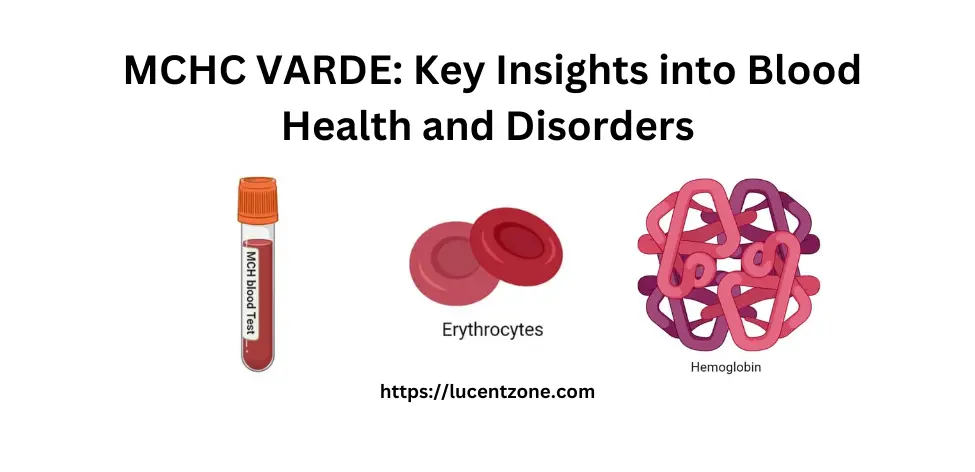MCHC means Mean Corpuscular Hemoglobin Concentration. It shows how much hemoglobin is in your red blood cells. VARDE tells how MCHC helps doctors understand blood disorders and your health. MCHC shows the average amount of hemoglobin in a certain volume of packed red blood cells. VARDE means MCHC is useful for finding different blood conditions and checking your overall wellness.
Your red blood cells carry a protein called hemoglobin. MCHC (Mean Corpuscular Hemoglobin Concentration) checks how much hemoglobin is packed into each of your red blood cells. It’s part of the Complete Blood Count (CBC), a set of tests that give information about your blood. Normal MCHC levels range from 32% to 36%. But low or high MCHC can signal different health issues. For example, anemia (like iron deficiency, aplastic, or pernicious types), chronic disease, lead poisoning, lack of vitamins A or copper, and other conditions may cause abnormal MCHC. Getting the MCHC test is very safe. Slight pain, bruising where the needle went in, or a tiny infection risk are the only real concerns.
You may also like: Choosing the correct activity level
MCHC VARDE’s Role in Assessing Health
Comprehending Hemoglobin Concentration
Hemoglobin, the protein transporting oxygen within red blood cells, plays a crucial function in oxygen delivery and cellular metabolism’s processes. Through MCHC VARDE’s monitoring, invaluable insight into blood’s oxygen-carrying capacity is gained, aiding assessment of varied hematological conditions.
Diagnostic Significance Holds Importance
MCHC VARDE serves diagnostically, identifying and monitoring numerous health issues like anemia, hemolytic disorders, nutritional deficiencies. By analyzing MCHC VARDE alongside other hematological parameters, healthcare professionals accurately diagnose, manage wide-ranging medical scenarios.
Decoding MCHC VARDE Numbers
Normal Zone
The customary range for MCHC VARDE typically sits between 32 to 36 grams per deciliter (g/dL). Values in this band usually signify sound hemoglobin levels and apt oxygen transport.
Elevated MCHC VARDE
Sky-high MCHC VARDE levels could indicate conditions like hemochromatosis, spherocytosis, or dehydration. Further probing is crucial to pinpoint the root cause. Proper treatment must then follow.
Diminished MCHC VARDE
On the flip side, lowered MCHC VARDE values may flag iron lack anemia, thalassemia, or chronic ailments. Swift identification and management of these issues prevents complications, restoring optimal wellness.
Clinical Uses of MCHC
Blood Conditions
MCHC VARDE helps doctors diagnose and track many blood issues. Examples are iron shortage anemia, anemia from cell breakdown, and thalassemia. By checking MCHC VARDE with other blood tests, care teams can build tailored plans to best treat each patient.
Nutrition Check
MCHC VARDE also helps assess nutrition. Low levels might mean lack of iron, vitamins, or overall poor nutrition. This signals need for closer diet review and supplements if warranted.
Conclusion
In short, MCHC VARDE is key in blood medicine. It reveals one’s health status, enabling identification and care of various illnesses. When the levels are properly understood and considered, individuals and medical staff can collaborate for optimal wellness outcomes.
FAQ’s
What are the normal ranges for MCHC blood test results?
A healthy MCHC (Mean Corpuscular Hemoglobin Concentration) result is usually between 32g/dl – 36g/dl. Readings in this range show normal levels. Values inside this window indicate blood health is good.
What are the causes of high MCHC levels?
Conditions that influence the size and concentration of red blood cells, such as spherocytosis, autoimmune hemolytic anemia, polycythemia vera, vitamin deficiencies (B-12 and folate), and uncommon blood illnesses, can all contribute to high MCHC levels.
How is MCHC blood test performed?
The Mean Corpuscular Hemoglobin Concentration test is vital for diagnosing anemia. This blood test checks the concentration of hemoglobin in red blood cells. Hemoglobin transports oxygen through the body. The MCHC is usually part of a Complete Blood Count (CBC). Blood is drawn from a vein in your arm. Doctors often order the MCHC along with other tests. A low MCHC means less hemoglobin, leading to less oxygen reaching tissues. Normal or high MCHC levels indicate red blood cells can carry oxygen well. The MCHC test, combined with other red blood cell tests, helps identify anemia.

